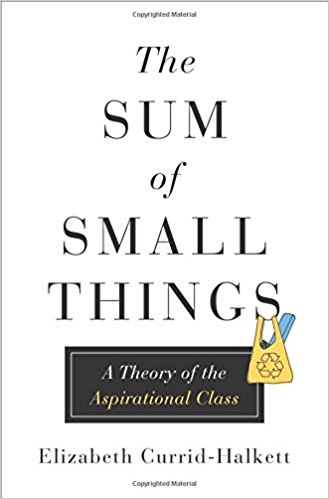You have /5 articles left.
Sign up for a free account or log in.
 The Sum of Small Things: A Theory of the Aspirational Class by Elizabeth Currid-Halkett
The Sum of Small Things: A Theory of the Aspirational Class by Elizabeth Currid-Halkett
Published in May of 2017.
For a few years now I’ve been trying to make sense of life in a small college town. The Sum of Small Things may provide some important clues to piecing together that particular puzzle.
Most everything we read nowadays is about the benefits of cities. Urban areas are thought to be where the creative class thrives. If it not for the extremes of real estate prices, it seems as if every highly educated professional (and the companies that seek them) would want to locate in a superstar city.
While I have nothing against the pro-urbanist movement, my own experience of living and working in a small college town causes me to question the conventional wisdom of place. What I’ve found over the past decade is that the quality of life in small college towns is extremely high. That small college towns filled with smart creative people and a range of cultural amenities.
Perhaps my small college town is an outlier. I sort of doubt it. Rather, my guess is that the high quality of life of small college towns is amongst the country’s best kept secrets.
All of which brings me to The Sum of Small Things. In this fantastic book, USC social scientist Elizabeth Currid-Halkett analyzes the BLS Consumer Expenditure Survey to understand America’s new aspirational class. What she finds is that the definition of affluence has shifted from one of conspicuous consumption - the name that sociologist Thorstein Veblen gave to the wealthy at the end of the 19th century - to inconspicuous consumption.
Conspicuous consumption is all about signaling status with expensive things. Think BMW’s and Rolex watches, Gucci handbags and Manolo Blahnik shoes. Inconspicuous consumption is about spending money on expensive but largely invisible experiential goods, such as education and other human capital enriching activities.
Currid-Halkett finds that the focus on intergenerational human capital investments of the most educated has grown rapidly over the past few decades. One example is that the top 10 percent of income earning households now devote four times as much spending on education as they did in 1996. She worries that this ability to provide one’s kids a lifetime of enrichment - from quality pre-schools to living in an expensive area with excellent schools and all the way through university - is serving to widen economic inequality.
The Sum of Small Things focuses exclusively on the urban aspirational class. Small towns and rural areas are never mentioned. What I found striking in reading the book was just how well the books describes and explains so much of my own small college town life.
Where I live, everyone drives some variant of the aging Subaru all-wheel drive wagon. Everyone wears the same waterproof athletic-hiking shoes and fleece vests to work.
Nobody seems to care much about material things. What people do care about is education. The public schools are excellent. Opportunities for enrichment activities abound. My small college town is a great place to be older, with excellent health care and lots of events to enjoy, but it is even a better place to be a kid.
I’d be interested to know if it is normative for small college towns to also boast excellent public school systems. Again, I’d bet that they do - but this is an empirical question.
The Sum of Small Things revealed, or at least revealed to me, that the fast growing and expensive to live in superstar cities share much in common with (at least one) small college town. What defines us is less size, but the aspirations of its residents.
Should social scientists looking to understand how the country is changing also look outside our big cities?
How does life in small college town differ from life in non-college small towns?
Does aspirational class reside in both big superstar cities and in small college towns?
What are you reading?




